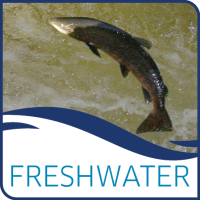The time series for net fishery and retained rod catch runs from 1952 to the most recently published season. The time series for released rod catch runs from 1994 to the most recently published season. The data are the summations of reports from individual fisheries. No attempt has been made to correct for non-returns or incomplete information held in the register of proprietors and occupiers.
Data files for the net fisheries contain effort data. Fixed engine effort is summarised as median number of traps operated within a given region in any month. Net and coble effort is summarised as median number of crews operated within a given region in any month. We have no comprehensive time series of fishing effort information associated with the rod and line fishery.
Reported catches are provided at the finest time scale (month) and geographical scale for which data are consistently available. Salmon Fishery Districts are defined in legislation and correspond either to a single river catchment together with adjacent coast or to groups of neighbouring river catchments and associated coastline. Districts may be further aggregated into salmon fishery regions whose extents are described in our Topic Sheet publication “Collecting the Marine Scotland Salmon and Sea Trout Fishery Statistics”. In order to comply with data protection legislation and the Code of Practise for Statistics, we now report data for net fisheries at regional level. Rod catches are provided for Reporting Areas. These are Salmon Fishery Districts where possible, but where there are few active rod fisheries the data are aggregated into geographically-coherent groupings of Districts. A list of Salmon Fishery districts with the corresponding Reporting Area is available to download below.
Reporting areas are characterised by Name and Report Order. Ordering the data with respect to “Report Order” sorts the areas spatially. Reporting areas are ordered counter-clockwise starting with the Tweed as Report Order 1.
The categories by which sea trout data have been reported have varied through the time series (see “Collecting the Marine Scotland Salmon and Sea Trout Fishery Statistics”). Finnock catches have been reported since 2004. Finnock are sea trout which have spent less than a year at sea and are making their first return to fresh water and are not included in sea trout numbers. They may also be known as whitling or herling.
Catches of farmed multi-sea winter (MSW) and one-sea winter (1SW) salmon have been reported since 1994.
Marine Scotland have published topic sheets summarising the 2019 Official Statistics for both salmon and sea trout catches.
Data and Resources
| Field | Value |
|---|---|
| Publisher | |
| Modified | 2021-05-26 |
| Release Date | 2020-04-21 |
| Frequency | Annually |
| Identifier | 97aa2e89-30a0-42ba-b090-3fb8a66f1dac |
| Spatial / Geographical Coverage Area | POLYGON ((-7.20703125 55.125634064814, -7.20703125 61.246565554455, 0.263671875 61.246565554455, 0.263671875 55.125634064814)) |
| Spatial / Geographical Coverage Location | Scotland |
| Temporal Coverage | 1952-01-01 to 2019-12-31 |
| Language | English (United Kingdom) |
| License | UK Open Government Licence (OGL) |
| Data Dictionary | Fishery statistics for a given season are published in the following April. Historical data will be updated each April with the publication of the following year’s data |
| Contact Name | Marine Scotland |
| Contact Email | |
| Public Access Level | Public |


